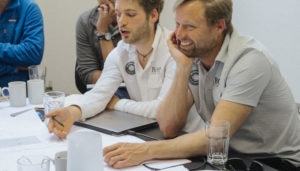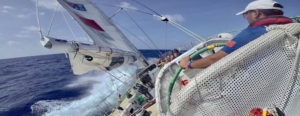A Russian Oligarch’s $500 Million Yacht is in the middle of Britain’s costliest divorce
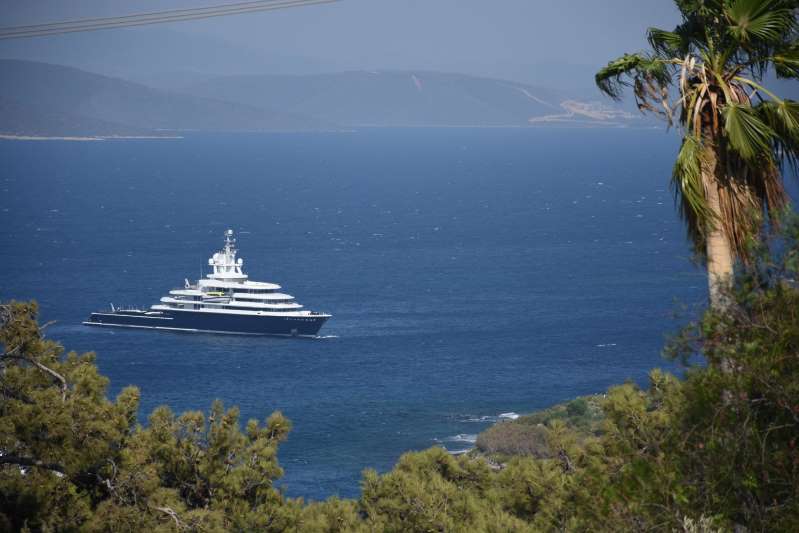
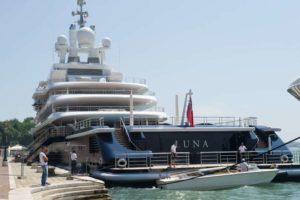
According to the New York Times, Luna has a spa, a swimming pool, two heliports and room for 18 guests, so she’d more like a floating luxury villa than a yacht. A crew of 50 keep all nine decks in pristine shape. The lifeboats cost $4 million apiece. Gleaming engines propel the vessel at a maximum speed of 22 knots.
But for now, the Luna isn’t moving. It sits in a dry dock in Dubai, the most fought-over prize in what has been called Britain’s most expensive divorce.
In December 2016, a High Court judge ordered Farkhad Akhmedov, a Russian billionaire who has owned a home in England since the ’90s, to pay the equivalent of $646 million to his ex-wife, Tatiana Akhmedova. He refused, arguing that the couple had been divorced in Russia more than a decade ago.
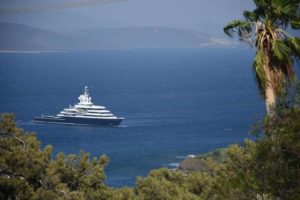
For more than a decade, Russian oligarchs have been parking their families and some chunk of their net worth in England. A deal was implied: The oligarchs got a haven from the pitiless realities of Putin-era Russia, and Britain got an influx of very rich people.
Now some oligarchs are learning that life here has hazards of its own. That goes even for nonresidents like Mr. Akhmedov, who never became a British citizen. Eager to keep British tax collectors away from his money, he limited the number of days he stayed in England to a maximum of 180 a year. (More recently, the number was reduced to 90 days.)
In January, he appeared on the “Putin List,” an inventory of business and political elites in Russia, published by the Trump administration. Seven oligarchs — though not Mr. Akhmedov — have since been subject to sanctions that prevent them from conducting business in the United States.
Even the Luna, the ultimate in high-end joy rides, is customized for a man anticipating trouble. It has a missile detection system, an anti-drone system, bulletproof windows and bombproof doors.
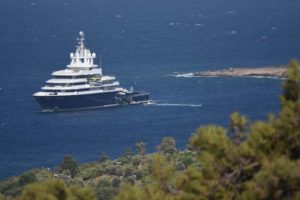
None of these features, however, have shielded Mr. Akhmedov from the British justice system, despite the exhaustive efforts of his legal and accounting team. Before arriving in the Middle East, the vessel had been on an epic journey, though one not measured in nautical miles.
As the nine-figure settlement was gaveled into divorce court history, Mr. Akhmedov began what the judge called a “campaign” to hide his assets “in a web of offshore companies.” Nothing demonstrates the breadth and ingenuity of that web like the Luna. Starting in November 2016, the yacht went on a whirlwind voyage, all of it on paper, in a feat of asset protection and financial engineering so elaborate that the judge diagramed it in an April ruling.
Initially, the seizure of the yacht in Dubai sounded like a setback for Mr. Akhmedov. Then, he and lawyers for the family trust that technically owns the Luna filed a claim — still pending — arguing that the fate of the yacht should be decided by a local court in Dubai, using Islamic law, known as Shariah.
Legal experts say Mr. Akhmedov has calculated that his odds of prevailing are better in a Shariah court, especially given that his ex-wife is a Christian who has acknowledged infidelity in their marriage. Stories in British tabloids have lately emphasized that Mr. Akhmedov is a practicing Muslim.
That is news to Ms. Akhmedova. In her first-ever interview, which took place recently in the office of a public relations firm, she said she had never seen her ex-husband kneeling on a prayer rug or going to a mosque, other than at a tourist site.
“Apparently because he was born in Azerbaijan, he’s a Muslim,” she says, her eyes widening with disbelief.
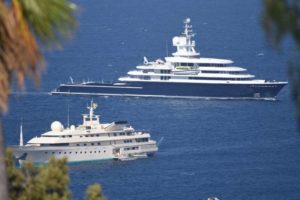
A sunny woman with a mild Russian accent, Ms. Akhmedova wore ripped denim jeans, a batch of string bracelets and a T-shirt that read “Free as a Butterfly.” She said she was reluctant to speak publicly about her divorce, because everything about it is painful, including the recent media coverage in Britain, which has made much of allegations of infidelity leveled by both sides.
She’s also startled by Mr. Akhmedov’s campaign to keep her from pocketing one cent of his $1.4 billion fortune, most of which he earned selling his stake in a Siberian energy company called Northgas. Contrary to popular assumptions, she said, she needs the money. She is living off a lump sum provided to her by Burford Capital, a litigation finance firm, which is helping to fund the legal efforts and will take a percentage of any results.
“I don’t want to play the victim, because it’s not my nature,” she said. “But I have to defend myself.”
Ms. Akhmedova said she had always wanted to settle out of court, quietly and for far less than she was awarded. She still speaks fondly of the years she spent with her ex-husband, whom she says she met in Moscow in 1989, when she was 17. He was nearly twice her age.
“He was wearing a suit,” she said. “He struck me as a very proper gentleman.”
The two married in 1993 and moved to London. He started off in the fur business, selling sable skins on the London Commodity Exchange. He later pivoted to the natural gas sector and, in 2012, sold his 49 percent stake in Northgas for a reported $1.4 billion.
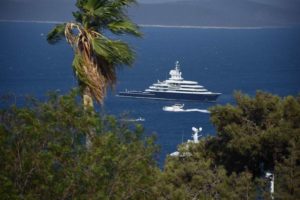
Over the years, he acquired a summer house in the south of France, two helicopters, vintage cars, fine art — by Rothko, Warhol and others — and a $26 million home in an upscale county outside London.
“We went from flying Aeroflot to British Airways to chartered flights,” said Ms. Akhmedova. Later, they flew on their own $50 million private jet.
During the years that Mr. Akhmedov amassed his wealth, the couple regularly toggled between hostilities and opulent cease-fires. She said she filed for divorce a second time in 2013 — she had rescinded the first petition a decade earlier — when one of her ex-husband’s paramours gave birth to a child.
They nonetheless tried another détente. That same year, Mr. Akhmedov bought more than $500,000 worth of jewelry for his wife, paid expenses for holidays and gave her access to his helicopters and credit cards, according to the judge overseeing the divorce. In 2014, Mr. Akhmedov acquired the Luna, which he purchased from Roman Abramovich, a friend and fellow oligarch. (Mr. Abramovich has had his own troubles with Britain recently, as the country has cracked down on a type of visa given to wealthy investors.)
“It would take four years to build a boat like that,” said Ms. Akhmedova, who helped arrange the sale. “So we thought, why not ask our friend? He’s got two boats, let’s ask him for one.”
Unfortunately, the change in behavior promised by her husband did not occur, she said. And once again, she pushed for divorce.
In 2003, Mr. Akhmedov had produced documents that purported to show that the couple had gotten a divorce from a Moscow court three years earlier. In his version of events, as explained by his spokesman, the marriage lasted a mere seven and a half years and was dissolved on the grounds of Ms. Akhmedova’s adultery. The subsequent time together — from 2000 to 2014 — the gifts and vacations? That was for the sake of the couple’s sons.
“To give them, as the children of divorced parents, the best possible experience of family life, my client also accompanied his ex-wife and children on occasional ‘family’ holidays,” said the spokesman, Ian Monk, in an email.
This narrative portrays Ms. Akhmedova as an opportunist, who pounced when her ex-husband had his billion-dollar payday, in 2012.
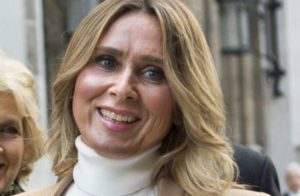
“Within a few days of the wealth being realized by my client’s sale of Northgas, Tatiana made her first approach for an English divorce,” Mr. Monk wrote. “My client says that is a second divorce.”
To underscore the point, Mr. Akhmedov refused to participate in the British divorce case, neither appearing in court nor sending a lawyer to the proceedings, which began in November 2015. He told the media that tensions between Britain and Russia would prevent him from getting a fair trial and that he regarded the case as political, part of Britain’s efforts to seize assets from well-off Russians.
Judge Charles Haddon-Cave came to different conclusions. He ruled that the 2000 Russian divorce documents were “forged.” Persuaded by Ms. Akhmedova’s testimony, he concluded that the couple had “remained married in all senses of the word,” until 2013.
Two days before the start of the trial, in November 2016, lawyers and accountants took the helm of the Luna and shuffled it to a handful of companies controlled by Mr. Akhmedov and his allies, in the Isle of Man, Panama and Liechtenstein. It eventually landed in a newly created family trust called Straight, which Judge Haddon-Cave wryly described in a ruling as “the antithesis of its name.”
“In my judgment, it is clear that Straight is simply another ‘cipher,’” he wrote, designed by Mr. Akhmedov “to evade enforcement.”
A few months after the Luna arrived in Dubai for maintenance, the Dubai International Financial Center Courts — which conducts business in English and uses English common law — impounded the vessel.
Lawyers for Mr. Akhmedov and Straight have since filed an appeal with a Dubai entity called the Joint Judicial Tribunal, a seven-member committee created in 2016 and granted the power to decide which court has jurisdiction over a legal proceeding. Mr. Akhmedov contends that his dispute is a matrimonial one, which should be decided by a local Shariah court. He is not looking to relitigate the divorce, his spokesman said. He simply wants a judgment that says the British order to transfer ownership of the yacht cannot be enforced in Dubai.
Predicting how the tribunal will rule is not easy, in part because it has issued only a dozen or so decisions. What is clear is that if Ms. Akhmedova prevails, she will look for a buyer and sell the yacht. It is equally clear that Mr. Akhmedov will litigate this case until he wins or the vessel melts into decrepitude.
“He would rather see the Luna rot in the Dubai heat,” said Mr. Monk, “than see it handed over to Tatiana.”
Story by David Segal for the New York Times.


